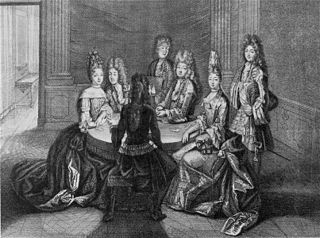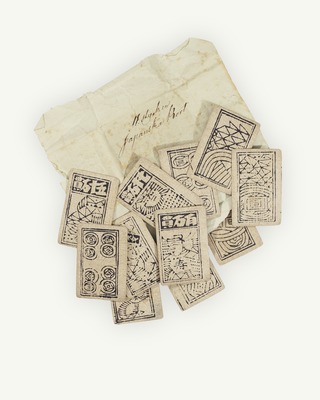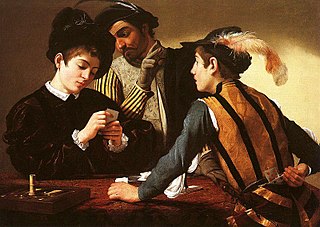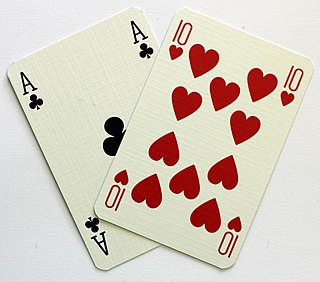Related Research Articles

Baccarat or baccara is a card game played at casinos. It is a comparing card game played between two hands, the "player" and the "banker". Each baccarat coup has three possible outcomes: "player", "banker", and "tie".

Lansquenet is a banking game played with cards, named after the French spelling of the German word Landsknecht, which refers to 15th- and 16th-century German mercenary foot soldiers; the lansquenet drum is a type of field drum used by these soldiers. It is recorded as early as 1534 by François Rabelais in Gargantua and Pantagruel.

Basset, also known as barbacole and hocca, is a gambling game using cards, that was considered one of the most polite. It was intended for persons of the highest rank because of the great losses or gains that might be accrued by players.

Faro, Pharaoh, Pharao, or Farobank is a late 17th-century French gambling game using cards. It is descended from Basset, and belongs to the Lansquenet and Monte Bank family of games due to the use of a banker and several players. Winning or losing occurs when cards turned up by the banker match those already exposed.

Kabufuda are Japanese playing cards used for gambling games such as Oicho-Kabu mainly used in the Kansai region.

Monte Bank, Mountebank, Spanish Monte and Mexican Monte, sometimes just Monte, is a Spanish gambling card game and was known in the 19th century as the national card game of Mexico. It ultimately derives from basset, where the banker (dealer) pays on matching cards. The term "monte" has also been used for a variety of other gambling games, especially varieties of three-card poker, and for the swindle three-card monte.

The following is a glossary of terms used in card games. Besides the terms listed here, there are thousands of common and uncommon slang terms. Terms in this glossary should not be game-specific, but apply to a wide range of card games played with non-proprietary packs. It should not include terms solely related to casino or banking games. For glossaries that relate primarily to one game or family of similar games, see Game-specific glossaries.

Madiao, also ma diao, ma tiu or ma tiao, is a late imperial Chinese trick-taking gambling card game, also known as the game of paper tiger. The deck used was recorded by Lu Rong in the 15th century and the rules later by Pan Zhiheng and Feng Menglong during the early 17th century. Korean poet Jang Hon (1759-1828) wrote that the game dates back to the Yuan dynasty (1271-1368). It continued to be popular during the Qing dynasty until around the mid-19th century. It is played with 40 cards, and four players.

Bavarian Tarock or, often, just Tarock, is a card game that was once popular in Bavaria and also played in parts of Austria as well as Berlin. The name is a clue to its origin in the historical German game of [Gross-]Tarock, a game using traditional Tarot cards. At some point in the mid- to late-18th century, attempts were made to emulate Taroc using a standard 36-card German-suited pack, resulting in the formerly popular, south German game of German Tarok. During the last century, the variant played with a pot (Haferl) and often known as Bavarian Tarock or Haferltarock, evolved into "quite a fine game" that, however, has less in common with its Tarock progenitor. German Tarok also generated the very similar game of Tapp, played in Württemberg, and both are related to Bauerntarock, Dobbm and the American games of frog and six-bid solo. Bavarian Tarock should not be confused with Königrufen, also known as Austrian Tarock or just Tarock.

Zwicken is an old Austrian and German card game for 4 to 6 players, which is usually played for small stakes and makes a good party game. It is one of the Rams group of card games characterised by allowing players to drop out of the current game if they think they will be unable to win any tricks or a minimum number of tricks. Despite a lack of sources, it was "one of the most popular card games played from the 18th to the 20th century in those regions of what is today Austria."

Tempeln, also known as Meine Tante – Deine Tante, and its 32-card version, known as Naschi Waschi, German Pharaoh, Stoß or Süßmilch, are very simple historical, German, gambling card games played with French or German playing cards. They differ from the more complex Basset and Faro in that they omit aspects such as lappé, paroli, etc.
Silesian Lottery, also called Card Lottery (Kartenlotterie), Card Tombola (Kartentombola), Großes Los, Grüne Wiese or Bullermännchen, is a simple, German, game of chance and gambling card game, that is played with two packs of 32 Bavarian-pattern or French-suited playing cards.

Blind Hookey, also known as Dutch Bank, Banker and Broker and Honest John, is a simple game of chance using playing cards. The game is popular in Germany where it is known as Häufeln, Bockspiel or Päckchen wenden, after the little packets of cards used.

Polish Bank, Polski Pachuck, Grundehrlich, Polish Red Dog or Stitch, is a gambling game using playing cards which resembles Häufeln and Mauscheln. The game is recorded as early as 1836 in the Austro-Hungarian Empire where it was banned on the grounds of being purely a game of chance or hazard.

Makao, Macao or Böse Neun is a simple dice game for any number of players using a single die and a dice cup. It is a game in which the players must reach a specified score without exceeding it, in that way it resembles other dice games like Über 12 ist tot or Fünfzehn ("Fifteen") as well as the card games of Siebzehn und Vier and Black Jack. It is derived from the eponymous card game of Macao, which itself is a possible predecessor of the popular gambling game of Baccara. Like its eponymous cousin, its name comes from the city of Macao, the "Monte Carlo of the East".

Twenty-one, formerly known as vingt-un in Britain, France and America, is the name given to a family of popular card games of the gambling family, the progenitor of which is recorded in Spain in the early 17th century. The family includes the casino games of blackjack and pontoon as well as their domestic equivalents. Twenty-one rose to prominence in France in the 18th century and spread from there to Germany and Britain from whence it crossed to America. Known initially as vingt-un in all those countries, it developed into pontoon in Britain after the First World War and blackjack in Canada and the United States in the late 19th century, where the legalisation of gambling increased its popularity.

Letzter Stich is a card game for 3 or 4 players in which the aim is solely to win the last trick. It originated in Germany and the names mean "last trick" respectively. It has been described as suitable for children, yet having a "surprising wealth of interesting game situations." It should not be confused with Letzter, a reverse game of greater complexity where the aim is to lose the last trick.

Pontoon, formerly called Vingt-Un, is a card game of the banking family for three to ten players and the "British domestic version of Twenty-One," a game first recorded in 17th-century Spain, but which spread to France, Germany and Britain in the late 18th century, and America during the early 19th century. It is neither a variant of nor derived from Blackjack. Both are descended from the early British version of Vingt-Un. In Britain, it first became known as Pontoon during the First World War, the name apparently being a soldier's corruption of its former French name. The game has no official rules and varies widely from place to place. It is a popular family game, but also widely played by children, students, and members of the armed forces. In 1981, Pontoon was the third most popular card game in Britain after Rummy and Whist. It has been described as "an amusing round game and one which anyone can learn in a few minutes."
Herzblatt or Herzblättchen is a German card game of the ace–ten family for two to five players. It bears a certain resemblance to the extinct 19th-century game of Piquesept, however without the special rules associated with the trump Seven.
Onze et demie, also Onze et demi, is an historical German banking game for any number of players and a close relative of Vingt et un.
References
- ↑ Actually in Geneva, where we find it banned by an Ordonnance des Magnifiques & Très-Honorés Seigneurs Sindics & Conseil [of Geneva] dated 22 January 1774, forbidding “de joüer aucun jeu de hazard ou de reste sous quelque dénomination que ce soit, & notamment celui appellé Macao” (see E. Rivoire, Bibliographie historique de Genève au XVIIIe siècle, Geneva, 1897, no. 1398).
- ↑ Zollinger 1997, p. 302.
- ↑ Lentner 1855, p. 111.
- ↑ Perles 1891, p. 312.
- ↑ Meyers Konversationslexikon (1908). "Macao"
- ↑ Schnitzler 1927.
- ↑ "The Virginians, by William Makepeace Thackeray".
